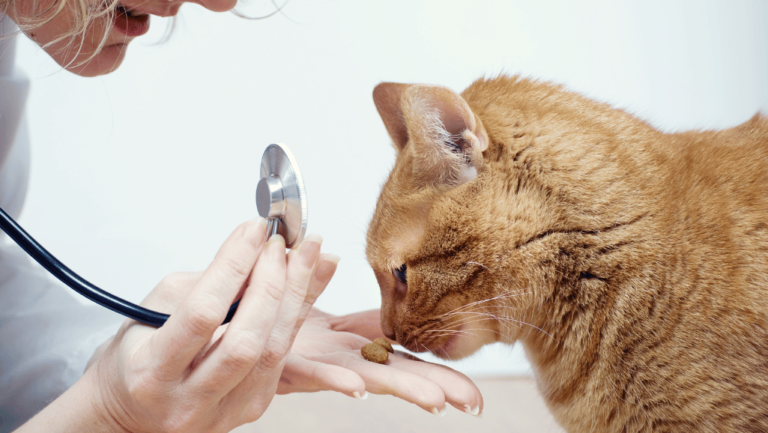Allergies are a common medical condition in cats, with feline allergies caused by the immune system overreacting to allergens. From insect allergies to food allergies, atopic dermatitis to contact allergies, cats can experience various types of allergies that can affect their skin, respiratory system, and digestion. If your furry feline is showing signs of allergies, it’s important to identify the specific allergen and consult with a veterinarian for a personalized treatment plan.
Key Takeaways:
- There are different types of allergies in cats, including environmental allergies, flea allergies, food allergies, atopic dermatitis, and contact allergies.
- Common symptoms of cat allergies include itching, respiratory issues, gastrointestinal problems, and skin inflammation.
- Diagnosing cat allergies may involve a thorough examination, medical history review, and various tests to identify the specific allergen.
- Treatment options for cat allergies vary depending on the type and severity of the allergy and may include medications, itchy skin relief measures, and allergen avoidance.
- Preventative measures and managing the cat’s environment can help alleviate and prevent Allergy Treatment Options for Cats.
Types of Cat Allergies
Cats can experience different types of allergies, including environmental allergies, flea allergies, food allergies, atopic dermatitis, and contact allergies.
Environmental allergies in cats are triggered by substances like pollen, grass, mold, and dust.
Flea allergies occur when a cat has a severe reaction to flea bites, causing intense itching and skin irritation.
Food allergies in cats are caused by their immune system’s reaction to certain ingredients in their diet, such as beef, dairy, wheat, or chicken.
Atopic dermatitis is a skin condition that results from allergic reactions to environmental allergens.
Contact allergies are the least common type of cat allergy and occur when a cat’s skin reacts to an irritant it comes into contact with.
Each type of allergy may present different symptoms and require different treatment options. Understanding the specific type of allergy is essential for effective management.
Environmental allergies in cats can be triggered by various substances.
Symptoms of Cat Allergies
Cats with allergies may display a range of symptoms, including sneezing, coughing, wheezing, itchy and watery eyes, ear infections, gastrointestinal issues like vomiting or diarrhea, snoring, swollen and tender paws, excessive grooming, loss of fur, and inflamed or dry skin. In some rare cases, anaphylaxis, a severe allergic reaction, may occur. It is important to monitor any changes in a cat’s behavior or health and consult with a veterinarian if allergies are suspected.
Allergy Symptoms in Cats:
- Sneezing
- Coughing
- Wheezing
- Itchy and watery eyes
- Ear infections
- Gastrointestinal issues like vomiting or diarrhea
- Snoring
- Swollen and tender paws
- Excessive grooming
- Loss of fur
- Inflamed or dry skin
Diagnosing Cat Allergies
When your cat exhibits symptoms of allergies, it’s important to get a proper diagnosis to determine the cause and develop an effective treatment plan. Diagnosing cat allergies involves a comprehensive examination by a veterinarian, who will utilize various methods to identify the specific allergen causing the allergic reaction.
First, the vet will review your cat’s medical history to gather information about any previous allergic reactions or known triggers. This will provide important insights into your cat’s overall health and help guide the diagnostic process.
Next, a physical exam will be conducted to assess your cat’s overall condition and look for any visible signs of allergic reactions such as skin inflammation, redness, or sores. The vet may also examine the cat’s ears and respiratory system for any indications of irritation or inflammation.
To pinpoint the exact allergen, diagnostic tests may be performed. Blood tests can identify specific antibodies in your cat’s system that indicate an allergic response. Skin tests, on the other hand, involve applying small amounts of potential allergens to the cat’s skin and monitoring for reactions. These tests are particularly useful in diagnosing environmental allergies.
In cases of suspected food allergies, a veterinarian may recommend an elimination diet trial. This involves removing certain ingredients from your cat’s diet and gradually reintroducing them to observe any allergic reactions. By carefully monitoring your cat’s diet and noting any adverse reactions, the vet can identify the specific food ingredient triggering the allergy.
Working closely with a veterinarian is crucial during the diagnostic process to ensure accurate diagnosis and determination of the most suitable treatment plan. By identifying the specific allergen causing your cat’s allergies, you can take the necessary steps to manage and alleviate their symptoms, improving their overall quality of life.
Treating Cat Allergies
The treatment for cat allergies depends on the type of allergy and the severity of the symptoms. By implementing a comprehensive approach that combines medication, environmental management, and appropriate care, cat owners can help alleviate their pet’s allergy symptoms and improve their quality of life. Here are some common allergy treatment options for cats:
1. Medications
Cat allergy medications, such as prescription shampoos or ear flushes, anti-inflammatory topicals, oral antibiotics, injectable medications, corticosteroid therapy, and lotions, ointments, ear drops, or eye drops, can be prescribed by a veterinarian to relieve symptoms and manage the inflammatory response caused by allergies. It is important to consult with a veterinarian before administering any over-the-counter medications to ensure the right dosage and to avoid any adverse reactions.
2. Allergen-Specific Immunotherapy
Allergen-specific immunotherapy, also known as allergy shots, can be highly effective in treating certain types of cat allergies. This treatment involves gradually desensitizing the cat’s immune system to specific allergens through regular injections. Over time, the cat’s immune system becomes less reactive to the allergen, reducing the severity of allergic reactions.
3. Prescription Dietary Supplements
Dietary supplements, such as fatty acids and specific nutrients, can help support the cat’s immune system, reduce inflammation, and improve their skin health. These supplements can be recommended by a veterinarian as part of the overall treatment plan for cat allergies.
4. Environmental Control
Managing the cat’s environment is crucial in reducing exposure to allergens. Here are some tips for cat allergy management at home:
- Use flea control products to prevent flea allergies.
- Opt for dust-free litter to minimize respiratory irritants.
- Regularly clean the cat’s bedding and vacuum the house to remove allergens.
- Ensure the cat’s living space is well-ventilated.
- Implement a hypoallergenic diet if food allergies are suspected.
By combining these treatment options and working closely with a veterinarian, cat owners can effectively manage their pet’s allergies and provide them with the relief they need.
Managing Cat Allergies at Home
When it comes to managing cat allergies, taking steps at home can make a big difference in reducing allergens and keeping your feline friend comfortable. By implementing a few simple strategies, you can help prevent allergic reactions and create a safer living environment for your allergic cat. Here are some cat allergy prevention and management tips:
Veterinarian-Approved Parasite Control
Regularly using veterinarian-approved parasite control products on your cat can help minimize allergic reactions caused by flea bites. Flea allergies are a common trigger for cats with allergies, so keeping your cat protected from fleas can greatly reduce their discomfort.
Dust-Free Litter
Choose a dust-free litter for your cat’s litter box to minimize allergens in the air. Dust-free litter can reduce respiratory irritation caused by allergens present in traditional litters, helping to alleviate your cat’s allergy symptoms.
Frequent Cleaning
Cleaning your home regularly is essential for maintaining an allergy-friendly environment. Vacuuming carpets, rugs, and furniture, as well as dusting surfaces, can help remove allergens such as dust mites and pet dander. Use a high-efficiency particulate air (HEPA) filter vacuum cleaner for optimal allergen removal.
Clean and Wash the Cat’s Bedding
Regularly clean your cat’s bedding to minimize allergen buildup. Washing bedding in hot water helps eliminate allergens, providing a cleaner and safer sleeping space for your cat.
Healthy Diet
Feeding your allergic cat a healthy diet free of known food allergens can help improve their overall immune system and minimize allergic reactions. Allergies to certain ingredients, such as beef, dairy, wheat, or chicken, can exacerbate symptoms. Consult with your veterinarian for guidance on selecting an appropriate hypoallergenic or limited ingredient diet for your cat.
Avoid Smoking around the Cat
Secondhand smoke can worsen respiratory symptoms in cats with allergies. Avoid smoking near your cat or inside your home to prevent exposure to harmful smoke particles and irritants.
Consult with Your Veterinarian
For personalized advice on managing cat allergies, consult with your veterinarian or a veterinary specialist. They can provide further recommendations on specific products, strategies, and environmental modifications tailored to your cat’s needs.
By implementing these cat allergy management tips and creating an allergy-proof home, you can help alleviate your cat’s allergy symptoms and provide them with a healthier and more comfortable living environment.
Conclusion
Allergies are a common condition in cats, but the good news is that they can be effectively managed with the right diagnosis and treatment. It is crucial to work closely with a veterinarian to identify the specific allergens causing your cat’s allergies and develop a customized treatment plan.
By implementing preventative measures, such as using appropriate medications, creating an allergen-free environment, and managing your cat’s diet, you can help alleviate your pet’s allergy symptoms and improve their overall quality of life. Regular check-ups with your veterinarian are essential to monitor your cat’s progress and make any necessary adjustments to the treatment plan.
Remember, each cat is unique, and what works for one may not work for another. Consulting with a veterinarian ensures accurate diagnosis and guidance regarding the best treatment options for your specific cat. With proper care and management, you can help your cat live a healthier and happier life, free from the discomfort of allergies.
FAQ
What are the different types of allergies that cats can experience?
Cats can experience environmental allergies, flea allergies, food allergies, atopic dermatitis, and contact allergies.
What are the symptoms of cat allergies?
Common symptoms of cat allergies include sneezing, coughing, wheezing, itchy and watery eyes, ear infections, gastrointestinal issues, snoring, swollen and tender paws, excessive grooming, loss of fur, and inflamed or dry skin.
How are cat allergies diagnosed?
Cat allergies are diagnosed through a thorough examination by a veterinarian, which may include reviewing the cat’s medical history and performing diagnostic tests such as blood tests or skin tests.
What are the treatment options for cat allergies?
Treatment options for cat allergies can include prescription medications like shampoos, ear flushes, and corticosteroids, as well as allergen-specific immunotherapy (allergy shots) and dietary supplements. Antihistamines may also be recommended in some cases.
How can I manage cat allergies at home?
Managing cat allergies at home can involve using veterinarian-approved parasite control, dust-free litter, and frequent cleaning. It’s also important to feed a healthy diet free of known food allergens and avoid smoking around the cat.
What is the importance of working with a veterinarian to treat cat allergies?
It is essential to work closely with a veterinarian to accurately diagnose cat allergies and determine the best treatment plan for the individual cat’s needs. Veterinarians can provide guidance on specific medications and strategies to manage allergies effectively.
Can cat allergies be effectively managed?
Yes, with the right diagnosis and treatment, cat allergies can be effectively managed. By implementing preventative measures, using appropriate medications, and managing the cat’s environment, owners can help alleviate their pet’s allergy symptoms and improve their quality of life.

















